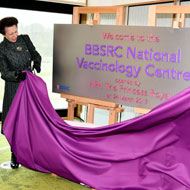
£24m facility will work on new livestock vaccines
HRH the Princess Royal has officially opened a £24 million research centre for the development of livestock vaccines.
The BBSRC National Vaccinology Centre is home to 100 scientists who are working on cutting edge vaccines for a variety of livestock diseases, including those that can affect humans.
Based at the Pirbright Institute in Surrey, the centre mainly focuses on poultry diseases such as avian influenza and Marek’s disease, but scientists also develop vaccines for other animal viruses, including African horse sickness virus.
Recent breakthroughs at the institute include the development of a new-generation of GM vaccines. Quicker and cheaper to produce, they protect against a variety of diseases, paving the way for ‘universal’ vaccines against several different strains of viruses, such as avian influenza.
Dr Bryan Charleston, interim director and CEO of the Pirbright Institute, commented: ““We are very honoured to have HRH The Princess Royal here today to officially open the BBSRC National Vaccinology Centre: The Jenner Building.
“Our innovative new facilities will enable scientists to develop a greater understanding of virus-host interactions and how best to combat diseases using the latest technologies including the genetic modification of vaccines and viruses.
“Extensive investment by BBSRC and the government in our infrastructure and the unique expertise of our scientists and staff, well position the Institute to continue to deliver innovative world-leading science that provides economic and health benefits on a global scale.”
Images courtesy of The Pirbright Institute © 2017



 The latest
The latest